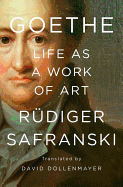
German philosopher Rüdiger Safranski (Romanticism: A German Affair) achieves serious artistic and intellectual heights in his epic biography of Johann Wolfgang von Goethe.
Translated into English by David Dollenmayer, Goethe: Life as a Work of Art is an amazingly detailed and comprehensive study of the 18th-century playwright, poet and novelist often considered "the Shakespeare of German literature." Safranski supplements his scholarship with Goethe's own words, including excerpts from his autobiography, letters to friends and family, and various poems. He expertly layers exegesis of Goethe's major works with biographical and historical exposition, resulting in a thorough understanding of Goethe's development as an artist and thinker. The curve of this development is striking in the way it belies popular conceptions of Goethe, who's often seen as a pioneer of Romanticism. Safranski reveals a writer of great emotion and genius tempered by skepticism and introspection, who slowly turns away from the sentimentalism of his age and toward the quieter revelations of the natural sciences. Safranski devotes as much time to Goethe's scientific treatise Theory of Colors as he does to Faust and The Sorrows of Young Werther.
Goethe: Life as a Work of Art also succeeds on another level. Safranski, who has written biographies of Friedrich Nietzsche and Arthur Schopenhauer, uses Goethe's life to explore and expound on a number of philosophical ideas and aesthetic theories. "Everyone must sense and find their own God, which means nothing more than grasping the guiding principle of their life," he writes after paraphrasing Goethe's conception of divinity. In this way, Goethe: Life as a Work of Art transcends biography and becomes a compelling overview of German philosophy. --Scott Neuffer, freelance journalist, poet and fiction author

